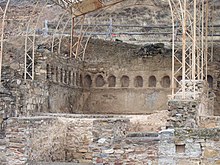Apodyterium
This article needs additional citations for verification. (December 2009) |


In ancient Rome, the apodyterium (from [ἀποδυτήριον] Error: {{Lang-xx}}: text has italic markup (help), place where to undress) was the primary entry in the public baths, composed of a large changing room with cubicles or shelves where citizens could store clothing and other belongings while bathing.[1] Privately owned slaves, or one hired at the baths, called a capsarius, would look after belongings while citizens enjoyed the pleasures of the baths. A contemporary Roman schoolbook quotes a wealthy young Roman schoolboy who entered the baths, leaving his slave behind in the apodyterium: "Do not fall asleep, on account of the thieves."
This was used in the 2009 Scripps National Spelling Bee.
